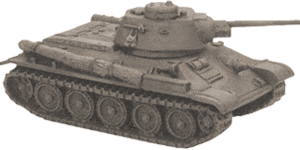The Full World War II Magazine Book Review
World War II Magazine (a publication of the Weider History Group - the world's largest publisher of history magazines) in its November/December 2012 issue is publishing it's review of Why Germany Nearly Won: A New History of the Second World War in Europe. Reviewer Conrad Crane finds that Why Germany Nearly Won is a "thought provoking book" whose "case deserves to be heard". The review provided below is as published (text only: minus two accompanying pictures and book title/publisher/pricing information):
This book’s title doesn’t adequately describe the ambitions of the author. Steven D. Mercatante goes beyond simply restating historians’ standard reasons for why the Wehrmacht was so effective in World War II - its display of operational and tactical brilliance based on mobility, initiative, unit cohesion, and experienced leadership. In fact, his book could have been titled How Germany Could Have Won, since Mercatante continually points out bad decisions, many at the strategic level, that cost the Third Reich still greater success and perhaps final victory. He even postulates that as late as 1942, Hitler still could have beaten the Allies by seizing enough key territory and resources in the Soviet Union to establish an unstoppable economic powerhouse. But Mercatante’s main purpose is to counter the widespread arguments that brute force was the main reason for success in World War II—that stronger combatants could generally wear down and steamroll weaker opponents with sheer numbers. The Germans, he argues, repeatedly demonstrated that qualitative advantages could be more important than quantitative superiority in men and materiel, and that the Allied armies eventually won because they became better at mobile and combined arms warfare than their enemies. After describing the German military system’s deep historical roots, Mercatante concentrates on its impressive wartime record in spite of erratic leadership at the highest levels and significant economic shortcomings. In doing so, he ironically undercuts the reputation of German engineering by highlighting maintenance problems and design flaws that crippled battlefield performance—such as key campaigns late in the war, where the Wehrmacht lost more tanks to breakdowns than to enemy gunfire. Why Germany Nearly Won centers largely on the mammoth struggle on the Eastern Front, with considerably less focus on the Western European and Mediterranean Theaters. The battles in Russia are often described in excruciating detail, complemented by rather busy maps. The Soviet victory only came after the Red Army developed the experienced leadership, better weapons, mass production, new tactics, and efficient manpower policies that enabled it to exercise and sustain a superior form of operational art across vast distances. In the meantime, the Soviet Union’s American and British allies drained German resources with strategic bombing and land campaigns in North Africa, Italy, and northwest Europe, and also eventually became qualitatively better than their foes. Mercatante, a corporate tax attorney, crafts the book like a legal brief, intent on proving his point without going into much detail on counterarguments. He relies heavily on secondary sources, especially those by David Glantz, instead of broad research. As a result, he sometimes espouses some truly outlying assertions—such as emphasizing postwar American brutality in occupied Germany. His repeated recounting of massive Soviet casualties to emphasize German prowess actually makes it hard to ignore the brute force theory he wants to undercut. And he never provides the evidence to explain how Germany could have established and maintained a self-sufficient empire capable of defeating the United States. So this thought-provoking book is most suitable for readers with enough expertise to judge its merits against the vast array of relevant literature. But its case deserves to be heard. —Conrad Crane


